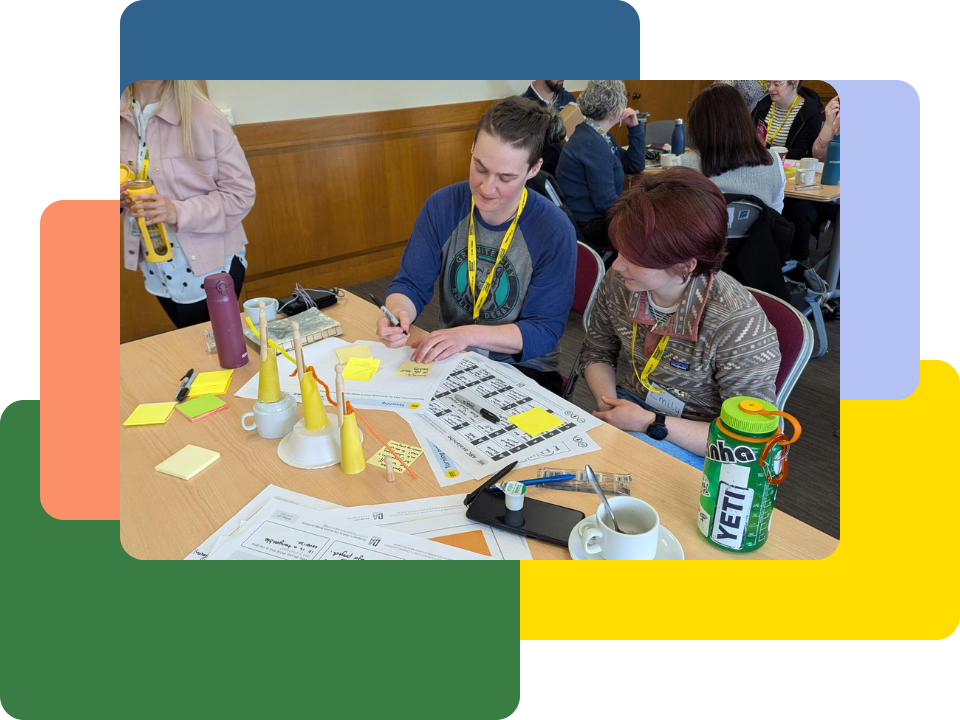
Try out some tools
Introduction to Tools and Methods
- 4 weeks
- Awareness level
- Online or in-person
Overview
You’ll learn how you can use the service design process to understand problems and then work towards solutions.
Who is this course for?
No matter your role or your organisation, you can apply a human-centred design thinking approach to engage with people, understand problems and bring ideas into reality.
How will this course help you?
We will help you to enhance your communication, storytelling, curiosity, and critical thinking skills.
The course will give you the opportunity to find out if service design is the right approach for your work by trying out a selection of basic tools and methods.
Course structure
- Session 1
- Session 2
- Gap task
- Session 3
- Session 4
Session 1
Breaking ground
Blending theory and practical activities, you will reflect on the presence and impact of biases and assumptions in everyday decision-making, setting the context for an introduction to service design.
You will cover examples of service design projects and reflect on your experiences of ‘good’ and ‘bad’ services.
You will be introduced to your design challenge, before working together with other learners to capture thoughts and experiences related to the challenge.
You will discuss and theme your insights, before joining a team dedicated to exploring a particular theme. Each team will reach a shared understanding of the topic to begin researching in the next session.
You will gain
- An awareness of the impact of bias and assumptions on decision-making.
- Understanding of what a service is, and the service design process.
- Ability to describe service experiences.
- Experience in knowledge capture and affinity mapping.
Session 2
Discover
This session will begin with an introduction to user research, including qualitative vs quantitative research, key approaches, ethics, and informed consent.
You will create a user research plan according to your theme – exploring what you want to find out, where you might find it, and from whom. You will then be introduced to a selection of user research methods, which you will practise.
Considering what questions must be asked – focussing on lived experience of problems rather than jumping to solutions – you will practise interview skills in different roles.
You will gain
- Understanding of the relationship between quantitative and qualitative data
- Awareness of user research, including approaches, ethics, and informed consent
- Experience in planning user research
- Experience in planning and conducting user interviews
- Awareness of user research methods
Between session 2 and 3
Gap task
Each team will complete a short gap task which will be based on their team user research plan.
Each person is expected to do a small piece of research (30-40 minutes) to bring back to session three.
You will gain
- Practical experience following a user research plan
- Hands-on experience with a small selection of user research methods
Session 3
Define
Teams will come together to discuss, combine, and analyse all the data they have collected, identifying emerging themes and patterns.
You will use problem trees to establish causes and effects of main problem areas emerging from your research, before learning to synthesise towards a defined problem area.
This problem will be flipped into an opportunity statement – “how might we” – a focused definition of the problem to be solved next.
You will gain
- Experience in analysis and synthesis of user research
- Ability to define problems and develop opportunity statements
Session 4
Develop and deliver
You will be introduced to tools for rapid idea generation, before prioritising, prototyping, testing, and iterating your ideas.
You will complete two rounds of prototyping split with a round of critical friend feedback.
Models, sketches, and storyboards are created to communicate and test ideas. You will identify a future goal or measure of success, before using service blueprinting or other planning tools to document the steps involved in the testing and delivery of the solution.
You will gain
- Awareness and experience of rapid idea generation tools
- Ability to filter and prioritise ideas
- Experience in service prototyping
- Experience of communicating service ideas
- Providing critical feedback
Timetable
- Online
- In-person
Online
Tuesday mornings
March 2026
Session 1
- Tuesday 3 March 2026
- 09:30 - 13:00
- 3.5 hours with two 15-minute breaks
Session 2
- Tuesday 10 March 2026
- 09:30 - 13:00
- 3.5 hours with two 15-minute breaks
Session 3
- Tuesday 17 March 2026
- 09:30 - 13:00
- 3.5 hours with two 15-minute breaks
Session 4
- Tuesday 24 March 2026
- 09:30 - 13:30
- 4 hours with two 15-minute breaks
Thursday mornings
September 2026
Session 1
- Thursday 3 September 2026
- 09:30 - 13:00
- 3.5 hours with two 15-minute breaks
Session 2
- Thursday 10 September 2026
- 09:30 - 13:00
- 3.5 hours with two 15-minute breaks
Session 3
- Thursday 17 September 2026
- 09:30 - 13:00
- 3.5 hours with two 15-minute breaks
Session 4
- Thursday 24 September 2026
- 09:30 - 13:30
- 4 hours with two 15-minute breaks
In-person
We are planning to run this course in Edinburgh in May 2026.
While we confirm a venue, no specific dates are currently scheduled for this course. If you'd prefer to learn in real life (as opposed to the virtual world), please register your interest.
Teaching and certification

Service Design Network accredited
- Online
- In-person
Equipment
To ensure the best possible experience for yourself and others, we recommend that your wear a headset to provide clarity of sound and improved live captions for those who use them.
Tools
We deliver our training using Microsoft Teams and Miro.
There is no requirement for you to install this software or create an account in advance of the course.
Although both tools are available as downloadable apps which may enhance your experience, each is available on the web in your browser.
Equipment and tools
Our in-person training involves speaker presentations and activities involving Sharpies, sticky notes, and paper.
Lunch
Lunch will be provided, alongside light refreshments at break times.
Cost and payment
Online
£ 990
GBP
In-person
Early bird (Save £100)
£ 1200
GBP
Discounted places
- Discounts for individuals
- Discounts for groups
If you are facing financial challenges
You may be eligible for a discounted place if you are:
- In receipt of benefits or on a reduced income
- Under 25, or a full-time student
- A freelancer, sole trader, or small business owner in your first year of trading
- Able to demonstrate personal circumstances that makes paying the full course fee a significant barrier to your participation.
If you are facing systemic discrimination
This is a self-identified process based on trust and a commitment to promoting diversity. You may be eligible for a discounted place if you identify as belonging to:
- People of the global majority
- Disabled and neurodivergent people
- LGBTQIA+ people.
Groups booking multiple places
Service design is a team activity! If you'd like to join a public course and learn with your colleagues, we can provide a 10% discount to help you bring at least two additional colleagues.
For groups larger than 5, speak to us about a customised course.
Organisations facing financial challenges
This includes charities with an annual income under £1 million and organisations delivering public good who are struggling to cover costs or issue a statement of going concern.
Book your place
Online - March 2026
Online - September 2026
Edinburgh - May 2026
Save £100
Register your interest before 31/01/26.